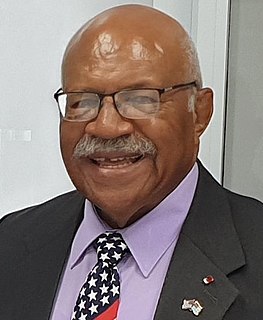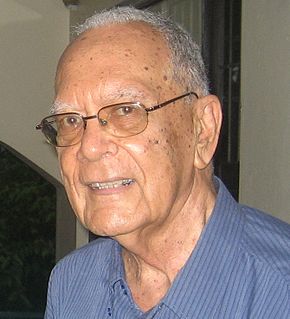Related Research Articles

Mahendra Pal Chaudhry is a Fijian politician and the leader of the Fiji Labour Party. Following a historic election in which he defeated the long-time former leader,Sitiveni Rabuka,the former trade union leader became Fiji's first Indo-Fijian Prime Minister on 19 May 1999,but exactly one year later,on 19 May 2000 he and most of his Cabinet were taken hostage by coup leader George Speight,in the Fiji coup of 2000. Unable to exercise his duties,he and his ministers were sacked by President Ratu Sir Kamisese Mara on 27 May;Mara intended to assume emergency powers himself but was himself deposed by the military leader,Commodore Frank Bainimarama.

Laisenia Qarase was a Fijian politician. He served as the sixth Prime Minister of Fiji from 2000 to 2006. After the military quashed the coup that led to the removal of Mahendra Chaudhry,Qarase joined the Interim Military Government as a financial adviser on 9 June 2000,until his appointment as Prime Minister on 4 July. He won two parliamentary elections,but a military coup removed him from power on 5 December 2006. He was later imprisoned on corruption charges brought by the military-backed regime.

Ratu Sir Kamisese Mara,CF,GCMG,KBE was a Fijian politician,who served as Chief Minister from 1967 to 1970,when Fiji gained its independence from the United Kingdom,and,apart from one brief interruption in 1987,the first Prime Minister from 1970 to 1992. He subsequently served as President from 1993 to 2000.

Brigadier-General Ratu Epeli Nailatikau,CF,LVO,OBE,MSD,KStJ,is a Fijian chief who was President of Fiji from 2009 to 2015. He has had a long career in the Military,diplomatic service,and government. From 2001 to 2006 he served as Speaker of the House of Representatives –the lower and more powerful chamber of the Fijian Parliament. He was also the chairman of the Parliamentary Appropriations Committee and of the House Committee. On 8 January 2007,he was appointed the interim Minister for Foreign Affairs and External Trade;he was moved to the post of interim Minister for Provincial Development and Multi-Ethnic Affairs in September 2008. In October 2008,he became Indigenous Affairs Minister "and effectively Great Council of Chiefs chairman". On 17 April 2009,he was appointed Vice-President by the Military government.

The prime minister of Fiji is the head of government of the Republic of Fiji. The prime minister is appointed by the president under the terms of the 2013 Constitution of Fiji. The prime minister is the head of the Cabinet and appoints and dismisses ministers.
Jai Ram Reddy,CF is an Indo-Fijian politician,who has had a distinguished career in both the legislative and judicial branches of the Fijian government. In 1998,he received Fiji's highest honour,the Companion of the Order of Fiji,in recognition of his services to his country.

Ratu Sir Penaia Kanatabatu Ganilau was the first President of Fiji,serving from 8 December 1987 until his death in 1993. He had previously served as Governor-General of Fiji,representing Elizabeth II,Queen of Fiji,from 12 February 1983 to 15 October 1987.

Sitiveni Ligamamada Rabuka,OBE,MSD,OStJ,is a Fijian politician best known as the instigator of two military coups in 1987. He was later democratically elected as Prime Minister of Fiji,serving from 1992 to 1999. He went on to serve as Chairman of the Great Council of Chiefs,and later served as Chairman of the Cakaudrove Provincial Council from 2001 to 2008. He was elected to this position on 24 May 2001 and re-elected for another three-year term on 13 April 2005.
Tupeni Lebaivalu Baba is a Fijian academic and politician,who founded the now-defunct New Labour Unity Party. Most members of this party later merged with several other centrist parties to form the Fiji Democratic Party. A former Professor of Education at the University of the South Pacific (USP),he later served as a senior research fellow at the Centre for Pacific Studies at the University of Auckland in New Zealand,from 2001 to the end of 2005. In the general election scheduled for 6–13 May 2006,Baba attempted a political comeback,this time on the ticket of the ruling Soqosoqo Duavata ni Lewenivanua (SDL),a political switch that generated a considerable degree of public discussion. Although his bid was unsuccessful,he was subsequently appointed to the Senate as one of nine nominees of the Fijian government.

The Fijian coups d'état of 1987 resulted in the overthrow of the elected government of Fijian Prime Minister Timoci Bavadra,the deposition of Elizabeth II as Queen of Fiji,and in the declaration of a republic. The first coup d'état,in which Bavadra was deposed,took place on 14 May 1987;a second coup d'état on 25 September ended the monarchy,and was shortly followed by the proclamation of a republic on 10 October. Both military actions were led by Lieutenant Colonel Sitiveni Rabuka,then third in command of the Royal Fiji Military Forces.

Murray Stuart McCully is a former New Zealand politician. He is a member of the National Party,and served as Minister of Foreign Affairs from 2008 to 2017.
Filipe Nagera Bole CBE,CF was a Fijian politician who hailed from the village of Mualevu on the island of Vanua Balavu in the Lau Group. He had a reputation as one of Fiji's few politicians untainted by scandal,and was noted for his moderate views. In October 2003,he endorsed calls for an end to racially segregated voting,saying that electing all members of the House of Representatives by universal suffrage would make voters and politicians think of the common national good,rather than communal interests.

The Soqosoqo ni Vakavulewa ni Taukei (SVT),occasionally known in English as Fijian Political Party,was a party which dominated politics in the 1990s and was the mainstay of coalition governments from 1992 to 1999.
Since attaining independence from the United Kingdom on 10 October 1970,Fijian history has been marked by exponential economic growth up to 1987,followed by relative stagnation,caused to a large extent by political instability following two military coups in 1987 and a civilian putsch in 2000. This was followed by another military coup in 2006. Rivalry between indigenous Fijians and Indo-Fijians,rather than ideological differences,have been the most visible cleavage of Fijian politics. Later in 2020,Fiji was hit by a coronavirus pandemic originated from Wuhan,China affecting the economy and the daily lives of the people.
Sir Vijay Raghubar Singh,KBE was an Indo-Fijian lawyer and politician who held Cabinet office in the 1960s and 1970s. Vijay Singh served in Prime Minister Ratu Sir Kamisese Mara's government in a variety of positions,including Attorney-General,and was president of the Indian Alliance,a division of the ruling Alliance Party. He quit the party in 1979 following disagreement with Alliance leadership and later joined the opposition National Federation Party. Vijay Singh was involved in the restructure of the Fiji sugar industry and was a leading member of the Jaycees movement in Fiji.
Dr. Ahmed Ali was a Fijian academic and politician who held Cabinet office several times from the late 1970s onwards. Unlike the majority of his fellow Indo-Fijians,he was aligned with the Alliance Party of Prime Minister Ratu Sir Kamisese Mara in the 1970s and 1980s,and with the Soqosoqo Duavata ni Lewenivanua Party of Laisenia Qarase in the early 2000s. He was one of only two Indo-Fijians to agree to serve in the interim government established in the wake of two military coups carried out to assert indigenous political supremacy in 1987.
Ratu Manunivavalagi Korovulavula,OF,is a Fijian political leader and civil servant. A former Senator,Korovulavula was appointed Minister for Transport in the interim Cabinet of Commodore Frank Bainimarama on 8 January 2007,following the military coup on 5 December 2006. He had also previously served in Ratu Sir Kamisese Mara's Interim Cabinet after the 1987 coup led by Sitiveni Rabuka. He was an unsuccessful candidate twice,for the Fijian Association Party and National Alliance Party,in the elections of 1999 and 2006,respectively. He served as treasurer of both parties.

Aiyaz Sayed-Khaiyum,is an Indo-Fijian politician and a cabinet minister. He is the Fijian attorney general and the Minister for Economy,Civil Service and Communications,and also serves the minister responsible for climate change. He is the third-highest polling candidate from the Fijian general elections of 2014 and 2018.

Peter Thomson is a Fijian diplomat and the United Nations Secretary-General's Special Envoy for the Ocean,and President of the United Nations General Assembly from September 2016 until September 2017. He served as Fiji's Permanent Representative to the United Nations February 2010 to August 2017,with concurrent duties as Fiji's Ambassador to Cuba.

Charles Walker,CMG is a retired civil servant and Alliance Party politician and former diplomat of Fiji.
References
- ↑ Howard, Michael (1991). Fiji: Race and politics in an island state . Vancouver: UBC Press. pp. 377–378. ISBN 0-7748-0368-1.